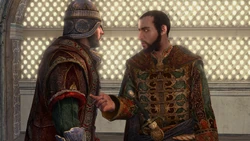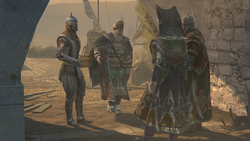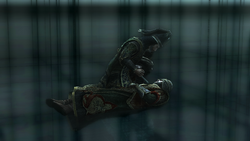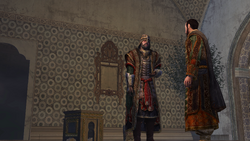(Undo revision 293393 by 121.220.74.11 (talk)) |
No edit summary |
||
| Line 19: | Line 19: | ||
'''Tarik Barleti''' (1470 – 1511) was the Captain of the [[Janissaries]] during the early 16th century, during the reign of [[Ottoman Empire|Ottoman]] Sultan [[Bayezid II]]. He was well known for his prowess as a leader, his admiration for Prince [[Selim I]], as well as his hatred for Prince [[Ahmet]]. |
'''Tarik Barleti''' (1470 – 1511) was the Captain of the [[Janissaries]] during the early 16th century, during the reign of [[Ottoman Empire|Ottoman]] Sultan [[Bayezid II]]. He was well known for his prowess as a leader, his admiration for Prince [[Selim I]], as well as his hatred for Prince [[Ahmet]]. |
||
| − | In 1511, Tarik devised a plot |
+ | In 1511, Tarik devised a plot meant to eliminate the remnants of the [[Byzantines|Byzantine Empire]] from where they hid, feigning allegiance with them to discover their base. Plotting in secrecy, Tarik was able to form an agreement with the former Byzantine heir and [[Templars|Templar]] [[Manuel Palaiologos]], and from there, he began his plan to eradicate the Sultan's long-standing enemies. |
| − | As captain of the Sultanate's most powerful fighters, Tarik was |
+ | As captain of the Sultanate's most powerful fighters, Tarik was as able a warrior as he was arrogant, and he led the Janissaries with an iron fist. Though stoic and somewhat cruel, Tarik was a man of honor, valuing strength, skill and logic above most other virtues. |
==Biography== |
==Biography== |
||
| Line 29: | Line 29: | ||
Tarik was born Skender Barleti in 1470. A Christian Albanian, he was the second eldest son of the family, in which he had four brothers and three sisters. His previous life was made irrelevant when the Ottoman's [[wikipedia:Devşirme|Devshirme system]] levied him into their ranks, where he eventually became one of the Janissaries. |
Tarik was born Skender Barleti in 1470. A Christian Albanian, he was the second eldest son of the family, in which he had four brothers and three sisters. His previous life was made irrelevant when the Ottoman's [[wikipedia:Devşirme|Devshirme system]] levied him into their ranks, where he eventually became one of the Janissaries. |
||
| − | Now |
+ | Now one of the Sultanate's elite soldiers, Tarik became extremely loyal to the Ottoman Empire, and after some time, he became the Janissaries' Captain. By then, his admiration for Prince Selim and hatred for Selim's brother Ahmet became very well-known among his peers, and other noteworthy figures of the Empire. |
| − | Though loyal to the Sultan, Tarik expressed great anger when Bayezid |
+ | Though loyal to the Sultan, Tarik expressed great anger when Bayezid appointed Ahmet as his successor. As Captain, Tarik's word had a significant influence on his subordinates, resulting in most of the Janissaries sharing his opinion of the two princes. Many Janissaries also came to believe that Bayezid had become a weak sovereign. |
| − | Also during his time as captain, Tarik released a lady of the Sultan's harem, [[Dilara]], |
+ | Also during his time as captain, Tarik released a lady of the Sultan's harem, [[Dilara]], out of kindness and a desire for her affections. Though Dilara did not return his feelings for her - which became a source of grief for him in his later years - Tarik nevertheless continued to work with her, tasking Dilara with reconnaissance missions. |
===Failure at Topkapı=== |
===Failure at Topkapı=== |
||
| Line 47: | Line 47: | ||
[[File:TAG_1.png|thumb|left|250px|Tarik meets with Manuel Palaiologos.]] |
[[File:TAG_1.png|thumb|left|250px|Tarik meets with Manuel Palaiologos.]] |
||
| − | Some time after the Topkapı attack, Tarik had several [[firearms]] prepare to be shipped, as part of a deal with Byzantine leader Manuel Palaiologos, in exchange for a large sum of money. Meeting at [[Constantinople]], Tarik gave Manuel access to the arsenal in order to retrieve the cargo. Afterwards, Tarik returned to the Janissary camp, where he awaited more news regarding the shipment. |
+ | Some time after the Topkapı attack, Tarik had several [[firearms]] prepare to be shipped to a Templar base, as part of a deal with Byzantine leader Manuel Palaiologos, in exchange for a large sum of money. Meeting at [[Constantinople]], Tarik gave Manuel access to the arsenal in order to retrieve the cargo. Afterwards, Tarik returned to the Janissary camp, where he awaited more news regarding the shipment. |
| − | Tarik eventually received a message from Manuel's forces that the firearms had arrived in [[Cappadocia]], which was accompanied by a map to the Byzantine base, to allow Tarik's own men to join them. With a few of Tarik's spies amongst the Byzantines, they expected to receive word once Manuel's forces had decamped, and planned to ambush them once they reached [[Bursa]]. |
+ | Tarik eventually received a message from Manuel's forces that the firearms had arrived in [[Cappadocia]], which was accompanied by a map to the Byzantine base, in order to allow Tarik's own men to join them. With a few of Tarik's spies amongst the Byzantines, they expected to receive word once Manuel's forces had decamped, and planned to ambush them once they reached [[Bursa]]. |
===Death=== |
===Death=== |
||
| Line 57: | Line 57: | ||
[[File:Honor_lost_won_v_6.png|thumb|250px|Tarik, moments before death.]] |
[[File:Honor_lost_won_v_6.png|thumb|250px|Tarik, moments before death.]] |
||
| − | In his final moments, Tarik confided with Ezio about his plans against the Byzantine Templars, revealing his scheduled ambush by giving him a parchment that detailed the location of the Templars. Tarik blamed himself |
+ | In his final moments, Tarik confided with Ezio about his plans against the Byzantine Templars, revealing his scheduled ambush by giving him a parchment that detailed the location of the Templars. Tarik blamed himself for his own pride, though he had faith that Ezio would see his plan through to the end. Asking Ezio to destroy the Templars for the sake of his homeland, Tarik passed away. |
| − | Suleiman was later informed of the Captain's untimely death by Ezio, and immediately felt guilty over his hasty judgement. He then instructed Ezio to finish Tarik's ploy, using |
+ | Suleiman was later informed of the Captain's untimely death by Ezio, and immediately felt guilty over his hasty judgement. He then instructed Ezio to finish Tarik's ploy against the Templars, using the information that he had gained from his investigations. |
| − | Tarik's death also affected the reputation of Prince Ahmet. Due to Tarik's quarrel with Ahmet a little before his death, the Janissaries had suspected the prince as the mastermind behind their captain's assassination. While conducting an investigation on Tarik's murder, the Janissaries had the [[Great Chain]] |
+ | Tarik's death also affected the reputation of Prince Ahmet. Due to Tarik's quarrel with Ahmet a little before his death, the Janissaries had suspected the prince as the mastermind behind their captain's assassination. While conducting an investigation on Tarik's murder, the Janissaries had the [[Great Chain]] over the [[Golden Horn]] raised, and would only lower it once the murderer had been detained. |
After [[Destruction of the Great Chain|destroying the Great Chain]], Ezio arrived at Cappadocia with [[Piri Reis]] by March of 1512. There, he met with Dilara, and managed to destroy the Templar city, and assassinate Manuel Palaiologos. |
After [[Destruction of the Great Chain|destroying the Great Chain]], Ezio arrived at Cappadocia with [[Piri Reis]] by March of 1512. There, he met with Dilara, and managed to destroy the Templar city, and assassinate Manuel Palaiologos. |
||
| Line 71: | Line 71: | ||
[[File:Uneasy meeting 3.png|thumb|250px|Tarik openly admitting his opinions of Ahmet.]] |
[[File:Uneasy meeting 3.png|thumb|250px|Tarik openly admitting his opinions of Ahmet.]] |
||
| − | As Captain, Tarik was a proud and ambitious man, |
+ | As Captain, Tarik was a proud and ambitious man, matched by his capability. Valuing law and order, Tarik enforced the city rules through any means, which were often cruel towards the people. This resulted in most civilians hating him and his men, though subsequently earning them the respect of most authority figures. |
Due to the political rights that the Janissaries held, Tarik was free to speak his mind about political matters, and whenever he spoke, he would be frank and direct about his opinion to most his comrades. His revelations of his honest opinions led to him being suspected of treason by Suleiman. |
Due to the political rights that the Janissaries held, Tarik was free to speak his mind about political matters, and whenever he spoke, he would be frank and direct about his opinion to most his comrades. His revelations of his honest opinions led to him being suspected of treason by Suleiman. |
||
Revision as of 09:36, 13 April 2012
Template:WPtargets

|
Here we seek to reveal the danger of blind faith. This article has yet to be sourced. Please add citations and a list of appearances verifying its relevance to Assassin's Creed. Failure to do so will result in the article being deleted. |
Tarik Barleti (1470 – 1511) was the Captain of the Janissaries during the early 16th century, during the reign of Ottoman Sultan Bayezid II. He was well known for his prowess as a leader, his admiration for Prince Selim I, as well as his hatred for Prince Ahmet.
In 1511, Tarik devised a plot meant to eliminate the remnants of the Byzantine Empire from where they hid, feigning allegiance with them to discover their base. Plotting in secrecy, Tarik was able to form an agreement with the former Byzantine heir and Templar Manuel Palaiologos, and from there, he began his plan to eradicate the Sultan's long-standing enemies.
As captain of the Sultanate's most powerful fighters, Tarik was as able a warrior as he was arrogant, and he led the Janissaries with an iron fist. Though stoic and somewhat cruel, Tarik was a man of honor, valuing strength, skill and logic above most other virtues.
Biography
Early life
- "This Empire is sick, and Bayezid - it pains me to say - is its cancer."
- ―Tarik Barleti, regarding the Ottoman Empire's current status.[src]
Tarik was born Skender Barleti in 1470. A Christian Albanian, he was the second eldest son of the family, in which he had four brothers and three sisters. His previous life was made irrelevant when the Ottoman's Devshirme system levied him into their ranks, where he eventually became one of the Janissaries.
Now one of the Sultanate's elite soldiers, Tarik became extremely loyal to the Ottoman Empire, and after some time, he became the Janissaries' Captain. By then, his admiration for Prince Selim and hatred for Selim's brother Ahmet became very well-known among his peers, and other noteworthy figures of the Empire.
Though loyal to the Sultan, Tarik expressed great anger when Bayezid appointed Ahmet as his successor. As Captain, Tarik's word had a significant influence on his subordinates, resulting in most of the Janissaries sharing his opinion of the two princes. Many Janissaries also came to believe that Bayezid had become a weak sovereign.
Also during his time as captain, Tarik released a lady of the Sultan's harem, Dilara, out of kindness and a desire for her affections. Though Dilara did not return his feelings for her - which became a source of grief for him in his later years - Tarik nevertheless continued to work with her, tasking Dilara with reconnaissance missions.
Failure at Topkapı
- Ahmet: "If you had a hand in this mess, Tarik, you have made a grave mistake. My father has chosen me as the next Sultan, not my brother."
- Tarik: "Ahmet, I am not depraved enough to imagine the conspiracy you accuse me of."
- —Ahmet and Tarik, just after Suleiman leaves their company.[src]

Tarik conversing in private with Ahmet.
In 1511, after a failed attack on Selim's son, Prince Suleiman I, at Topkapı Palace, Tarik met with Suleiman and Ahmet in private. There, Tarik offered to lead the investigation on the attack, though Suleiman said that he would, due to Tarik being a possible suspect. After a brief meeting with Ahmet, where Tarik openly admitted his dislike for the Prince, Tarik left the palace and returned to patrol the city.
Unbeknownst to Tarik, Suleiman tasked the Assassin Ezio Auditore da Firenze with the job of investigating him and his activities, due to his failure to defend the palace during the assassination attempt. From then on, Ezio tailed Tarik in secret, starting at the Grand Bazaar, where he and his men usually spent their time.
Plot against the Templars
- Janissary: "Everything is falling into place, efendim (my Lord)."
- Tarik: "Evet. (Yes.) For once."
- —Tarik and a Janissary, after receiving a letter from Manuel.[src]

Tarik meets with Manuel Palaiologos.
Some time after the Topkapı attack, Tarik had several firearms prepare to be shipped to a Templar base, as part of a deal with Byzantine leader Manuel Palaiologos, in exchange for a large sum of money. Meeting at Constantinople, Tarik gave Manuel access to the arsenal in order to retrieve the cargo. Afterwards, Tarik returned to the Janissary camp, where he awaited more news regarding the shipment.
Tarik eventually received a message from Manuel's forces that the firearms had arrived in Cappadocia, which was accompanied by a map to the Byzantine base, in order to allow Tarik's own men to join them. With a few of Tarik's spies amongst the Byzantines, they expected to receive word once Manuel's forces had decamped, and planned to ambush them once they reached Bursa.
Death
- Ezio: "He was loyal to your grandfather to the end, and through his efforts we have the means to save your city."
- Suleiman: "Ah, Tarik. He should not have been so secretive. What a terrible way to do a good thing."
- —Ezio and Suleiman, regarding Tarik's death.[src]
Unbeknownst to Tarik, Ezio Auditore - disguised as a Janissary - eavesdropped on his meeting within the Janissary camp. After learning of the Byzantine's locations, Ezio assassinated Tarik, under the orders of Suleiman, due to believing him guilty of treason.

Tarik, moments before death.
In his final moments, Tarik confided with Ezio about his plans against the Byzantine Templars, revealing his scheduled ambush by giving him a parchment that detailed the location of the Templars. Tarik blamed himself for his own pride, though he had faith that Ezio would see his plan through to the end. Asking Ezio to destroy the Templars for the sake of his homeland, Tarik passed away.
Suleiman was later informed of the Captain's untimely death by Ezio, and immediately felt guilty over his hasty judgement. He then instructed Ezio to finish Tarik's ploy against the Templars, using the information that he had gained from his investigations.
Tarik's death also affected the reputation of Prince Ahmet. Due to Tarik's quarrel with Ahmet a little before his death, the Janissaries had suspected the prince as the mastermind behind their captain's assassination. While conducting an investigation on Tarik's murder, the Janissaries had the Great Chain over the Golden Horn raised, and would only lower it once the murderer had been detained.
After destroying the Great Chain, Ezio arrived at Cappadocia with Piri Reis by March of 1512. There, he met with Dilara, and managed to destroy the Templar city, and assassinate Manuel Palaiologos.
Characteristics and personality
- "Tarik is a hard man, proud and capable but ambitious. And he admires my father greatly."
- ―Suleiman, on Tarik's behavior.[src]
At an early age, Tarik excelled in combat, and was able to endure the Janissaries' extremely rigorous training. In time, he had forgotten about his life before being levied, and began to show unwavering loyalty to the Ottoman Empire. His skill and loyalty eventually earned him the position of Captain.

Tarik openly admitting his opinions of Ahmet.
As Captain, Tarik was a proud and ambitious man, matched by his capability. Valuing law and order, Tarik enforced the city rules through any means, which were often cruel towards the people. This resulted in most civilians hating him and his men, though subsequently earning them the respect of most authority figures.
Due to the political rights that the Janissaries held, Tarik was free to speak his mind about political matters, and whenever he spoke, he would be frank and direct about his opinion to most his comrades. His revelations of his honest opinions led to him being suspected of treason by Suleiman.
Tarik valued strength of mind and body above words and doctrine. He often cited logic as his basis on judgment of character, as evidenced by his opinion on both of the Ottoman Empire's viable Sultan successors. Tarik also admired boldness and skill, as evidenced by his infatuation with Dilara.
Tarik was also a man of cunning and strategy, as seen in his planned ambush for the Byzantines. However, he was also very secretive about his ploys, only discussing his plans to his closest subordinates and men. Such secrecy resulted in his death, though he accepted full blame for his hubris.
Last Words
- Tarik: Ah, what a bitter irony. Is this the result of Suleiman's investigation?
- Ezio: You collude with the Sultan's enemies. What did you expect would come of such treachery?
- Tarik: I blame myself. Not for treason, but hubris. I was preparing an ambush. Preparing to strike the Byzantine Templars where they felt safest.
- Ezio: What proof do you have of this?
- Tarik: See here. This will lead you to the Byzantines in Cappadocia. Destroy them if you can.
- Ezio: You have done well, Tarik. Forgive me.
- Tarik: Protect my homeland, Assassin. Allah ashkina, (In God's name,) redeem the honor we have lost in this fight.
Trivia

Concept art of Tarik.
- Tarik is one of the few characters not to have an entry in the Assassin's Creed Encyclopedia.
- In the novelization of Assassin's Creed: Revelations, Tarik had a son.
- In the novelization for Revelations, the circumstances of Tarik's death were slightly different, as Ezio confronted him directly.
- In the memory "Honor, Lost and Won", if Ezio approaches Tarik unarmed while he observes the sparring Janissaries, Tarik will start a duel with Ezio, instead of ordering his men to attack. Tarik has three times the health and endurance of a regular Janissary, and is extremely difficult to kill.
- Whenever Tarik is injured, some Janissaries will intervene in the fight, either by confronting Ezio or pushing him, leaving him vulnerable to an attack.
Source
| |||||||||||||||||||||||||||||||||||||
